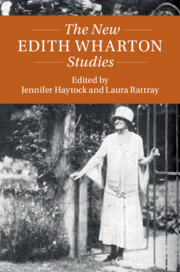Book contents
- The New Edith Wharton Studies
- Twenty-First-Century Critical Revisions
- The New Edith Wharton Studies
- Copyright page
- Contents
- Notes on Contributors
- Acknowledgments
- Editions and Abbreviations
- Introduction
- Part I Self and Composition
- Part II International Wharton
- Part III Wharton on the Margins
- Part IV Sex and Gender Revisited
- Chapter 11 Women, Art, and the Natural World in Edith Wharton’s Works
- Chapter 12 Wharton and the Romance Plot
- Chapter 13 Masculine Modernity: Fathers, Sons, and Generational Absolution in Wharton’s Fiction
- Chapter 14 Wharton’s Wayward Girls
- Bibliography
- Index
Chapter 12 - Wharton and the Romance Plot
from Part IV - Sex and Gender Revisited
Published online by Cambridge University Press: 28 November 2019
- The New Edith Wharton Studies
- Twenty-First-Century Critical Revisions
- The New Edith Wharton Studies
- Copyright page
- Contents
- Notes on Contributors
- Acknowledgments
- Editions and Abbreviations
- Introduction
- Part I Self and Composition
- Part II International Wharton
- Part III Wharton on the Margins
- Part IV Sex and Gender Revisited
- Chapter 11 Women, Art, and the Natural World in Edith Wharton’s Works
- Chapter 12 Wharton and the Romance Plot
- Chapter 13 Masculine Modernity: Fathers, Sons, and Generational Absolution in Wharton’s Fiction
- Chapter 14 Wharton’s Wayward Girls
- Bibliography
- Index
Summary
“Wharton and the Romance Plot” describes the relationship among three of Wharton’s novels that are heavily indebted to romance conventions – The House of Mirth, The Reef, and Summer. The failure of each narrative to reach the happy ending of a wished-for marriage provides readers with one means of questioning the actions of each pair of carefully drawn characters: is the absence of a fairy-tale ending the fault of Lily or Selden? Anna or George? Charity or Lucius? As Wharton changes the conventions of romance, she asks the reader to do a different kind of reading, a more socially based critique, one dependent on expectations by gender. Literary history seems to have prejudiced readers against Wharton’s early women characters, yet Henry James saw all too clearly how noble Anna Leathe was. With Lily Bart dead, and Charity Royall summarily wed, the fact that Anna wins the lover she desires breaks the often-cliched romance plot in her favor.
Keywords
- Type
- Chapter
- Information
- The New Edith Wharton Studies , pp. 189 - 201Publisher: Cambridge University PressPrint publication year: 2019

